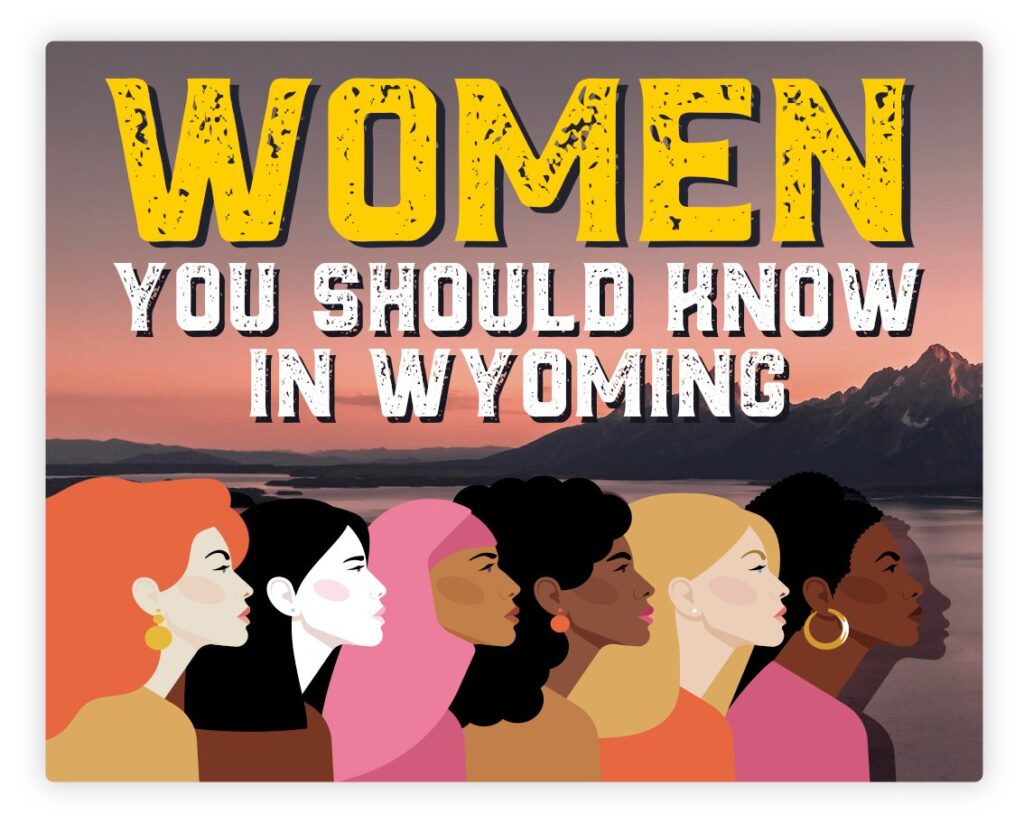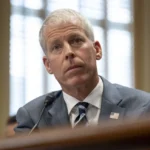WOMEN YOU SHOULD KNOW IN WYOMING: Laramie Duo Lead All-Woman Conservation Corps Crew
Lea Blasko and Cori Carpio build trails and relationships with Serve Wyoming volunteer team
- Published In: Other News & Features
- Last Updated: Jul 12, 2023

Wyoming Conservation Corps crew leader Cori Carpio uses a chainsaw to fell trees during a 10-day hitch of trail making. She co-leads an all-woman crew this summer in Wyoming. (Courtesy photo from Cori Carpio)

By Elizabeth Sampson
Wyoming’s history is full of trailblazing women—first woman to vote, first woman governor, first woman juror. When it comes to blazing actual trails in Wyoming’s backcountry, women are still leading the way.
This summer, Cori Carpio and Lea Blasko, of Laramie, are leading an all-woman Wyoming Conservation Corps (WCC) crew. They are performing difficult manual labor, battling wind, rain and mosquitoes, sleeping in a tent—and keeping one eye out for bears.
And they wouldn’t have it any other way. Both women are thrilled to camp for a living, and they don’t take their surroundings for granted.
“It’s hard to have a bad day when you look up and see the Tetons, and it’s a beautiful sunrise,” Blasko, 20, said.
The duo lead five other women on 10-day hitches doing conservation work around the state. They can be called on to make or maintain trails, build fence, complete habitat restoration, assist with historic preservation, do chainsaw work or complete other community service. Conservation Corps volunteer work benefits federal, state and local agencies.
“It’s very rewarding doing the hard work,” Blasko said. “It puts a smile on your face knowing that you are making a change.”
There are six conservation crews within the WCC program. In addition to the all-woman crew, there are four coed crews and an all-veterans crew. All participants are AmeriCorps national service members, and the program is managed by Serve Wyoming in partnership with the University of Wyoming Haub School of Environment and Natural Resources. As AmeriCorps members, their work is on a volunteer basis, but they receive a living stipend and a monetary educational reward for their service.
A typical day finds Carpio and Blasko rising from their tents at 5 a.m. to make breakfast for their crew and then working at least 10 hours.
As crew leaders, they develop a work plan after talking with their project contact and determine where the nearest town, stores, gas station and cell phone service will be. Before the crew completes their 60-day commitment on Aug. 16, they will volunteer in Grand Teton National Park, on Laramie Peak and in Hot Springs State Park near Thermopolis. Participants range in age from 19-25 and are from Wyoming and other states.

Leaving their mark
On a recent 10-day hitch, the crew worked on making a new hiking trail on Laramie Peak. Their project contact marked the trail, and then the crew cut a path that was about 18 inches wide and three inches deep, using pickaxes to remove all the vegetation, scraping away loose dirt and then tamping the trail down. Carpio, 27, said it takes about three or four hours to make 100 feet of trail, depending on the slope and if they have to cut into rock.
Despite the hard labor, the women are glad to know they are leaving their mark.
“The trails we just made, 10 years from now, we are going to be able to go on,” Carpio said. “It took us 10 days, but I know my friends are going to enjoy it, I’m going to enjoy it, my friends’ kids are going to enjoy it. That longevity is just insane to think about.”
Though women were part of WCC crews since the organization started in 2006, the first all-woman group launched in 2022 at the suggestion of former crew members, said program director Jim Fried.
“When women are looking at any of these jobs and getting into the workforce in public land management, working for the Forest Service—if you don’t see yourself represented, how do you think you can be there?” Fried said. “ That’s been the coolest thing—just how empowering that is.”
Fried said they selected Blasko and Carpio as crew leaders because of their positive attitudes and desire to lead women.
“[Lea] wanted to support women, and that was what really drove her to apply,” Fried said. “She really wanted to come to the program on that women’s crew specifically—being around women in that environment, being a role model and a leader and mentor, and getting experience in public land management.”
Carpio was the only woman on a WCC crew in 2021, Fried said, and she wanted to flip the script and lead an all-woman crew.
“All that experience that Cori brings and also her attitude—and really wanting to be in an environment that is supportive and inclusive and provide that experience to other women,” he said.
Carpio encourages women to join a crew, even if they lack camping or outdoor work experience.
“Everybody on this crew wants you to succeed,” she said. “It’s not a place of judgement. It’s more of a place of learning and caring for one another, because you have that person’s back for the rest of the summer.”
Camping in their blood
Some people might be reluctant to camp in the backcountry for work, but both Blasko and Carpio grew up in camping families and looked forward to the experience.
They are doing two hitches on Laramie Peak that will require them to hike in, carrying tents, water and dried food on their backs.
Born and raised in Laramie, Blasko spent her childhood camping, hunting, fishing, climbing and canoeing. Her love of the outdoors led her to join the Corps and the Haub School at UW, where she double majors in environment and natural resources and outdoor recreation and tourism. She said working with the WCC allows her to explore different conservation careers.
“I love the immersive experience and building connections with all my coworkers who are very passionate about all the things I am passionate about—and getting paid to camp,” Blasko said. “I couldn’t figure out a better situation to be in for the summer.”
Carpio’s mother was determined to make her three young daughters self-sufficient, and camping often is a good way to teach that skill.
“One year we took a trip called ‘48 in 08,’ so we camped all over the 48 continental states for one summer—just us and a little pop-up,” said Carpio, who hails from Bangor, Michigan. “We tried to hit all the national parks we could.”
At age 17, Carpio started teaching in a migrant summer school; she went on to earn a degree in physical education from Indiana Tech and then taught in Michigan, Montana and New Mexico. She encountered many students who didn’t grow up in the outdoors and felt it was inaccessible. As Carpio works with the WCC, she is brainstorming ways to help public school kids get outdoors.
“What I want is to build a curriculum that serves P.E. standards that uses conservation and Leave No Trace ideas . . .,” she said.
As she looks to the future, Carpio will remember this summer with a smile.
“The amount of times you just laugh so hard your stomach hurts—your arms and your legs are so tired, you’re on hour eight and have two more hours to work and you’re just so tired—then somebody does something and we will laugh so hard that there’s tears. Then you get back to work, and you feel so much more energized—that stuff I will carry with me.”













